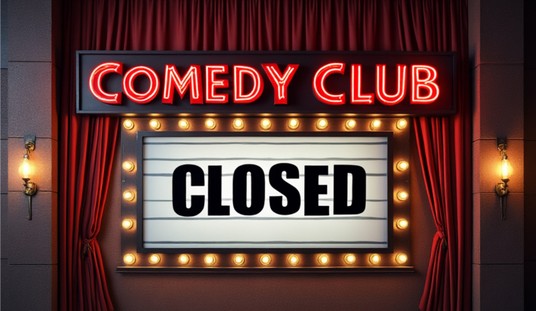“I think there’s another revolution coming. I’m not sure what it’s going to look like but I think it’s going to be very interesting and it’s going to unfold over the next ten years. And I think it needs to be a spiritual revolution because I think that our systems are broken. I don’t think our political system will ever work. No matter how great a man, if you cloned JFK and Abraham Lincoln and made them president it wouldn’t matter. Our system is just too corrupt and too broken.” Rainn Wilson
Wilson goes on to say that he expects to see wild pendulum swings between Left and Right in the coming years. The only answer he sees is a spiritual revolution among the young — “like they did in the ’60s.”
Because the ’60s brand of teen revolution that jettisoned God and authority and traditional values worked out so well the first time around? By all means, let’s try that again! Oy.
Wilson concludes: “It’s gonna have to go to that or we’re all going to destroy each other.”
Are those our only two options?
Wilson is right that our systems are broken — or at least many of them are. Every day it seems we discover a new reason to be concerned about the government infringing on our liberties or we see a sign that our society is in a state of moral decay. Who ever imagined an America where a government agency would demand to know the contents of a group’s prayers? President Obama recently told grads at The Ohio State University to beware of the voices doing their best to “gum up the works.” The sad reality is that “the works” have been gummed up for decades and, despite the best efforts of a generation of good Americans, the gears refuse to budge. Many are frustrated with both parties and are beginning to understand, perhaps for the first time, that our nation’s problems are too immense to be solved with political — or even human — solutions alone.
Dan Lutz is one man who feels this way. He said in a recent interview on 95.9 FM:
I’ve tried to have an impact through politics. I’ve tried to have an impact through community service but I just got to the point after that phone call that “Lord, this is up to you now. We need to be on our faces asking for your help.”
Lutz is the chairman of the Wayne County Republican Party. The phone call came from a state legislator who informed him that he planned to introduce legislation that would trample on the religious liberties of many in the state. The official worked with a left-wing group and crafted the legislation without consulting party leaders in his district or his constituents. Lutz said,
The next morning in my devotional time I was reading the book of Judges and reading how God just continually would have mercy on the nation of Israel when they got on their faces and cried out to him and that’s the point I was at. I was thinking, “Lord, this is not something we can really impact anymore. This tsunami of moral decay is just overcoming us.”
Lutz has a long history of serving his country and his community. In addition to being chairman of the county GOP, he is the elected Wayne County prosecutor. Prior to that he was a partner in a successful private law practice and worked as a city law director. He spent four years active duty in the U.S. Navy Judge Advocate General’s (JAG) Corps and has been in the U.S. Navy Judge Advocate General’s (JAG) Corps. Reserve since 1993. He is currently an appellate judge on the Navy Marine Corps Court of Criminal Appeals.
But he realized it wasn’t enough.
At around the same time Lutz received that phone call, Pastor Jerry O’Brien of Faith Harvest Fellowship in Wooster was thinking about prayer. His church is well-known in the community for concerts in the park, where they distribute free dinners to the needy, and for taking a 45’ truck to the fairgrounds for food distribution events. But after the National Day of Prayer in May, O’Brien said that he felt that his church needed to focus more on prayer. He told 95.9 FM:
I don’t feel that God wants us to do this once a year. I am feeling that God wants us to do this every day. … I knew that that was going to take a huge commitment from myself and my leadership.
Which is when Lutz called.
Lutz had met O’Brien when he attended a pro-life event on the anniversary of Roe v. Wade at O’Brien’s church, which is in the former home of the Big Picture Theater in downtown Wooster. He asked O’Brien if he would be willing to open up his church Monday through Friday for prayer from noon to 1:00 so those working downtown could come to pray.
“I don’t need someone to drop a house on me to know that this is from God,” said O’Brien.
Lutz said he was inspired by the story of Jeremiah Lanphier, who is credited with starting the Third Great Awakening — also called the Businessman’s Revival — which began in New York City in 1857. After enjoying many years of economic prosperity, the United States had overextended itself with visions of Manifest Destiny, which suddenly collapsed with the Panic of 1857:
By mid-October unemployment was 40,000 in New York. The numbers were high in Philadelphia and Boston, too. On Oct 14th the nation’s banking system collapsed. The Bank of New York, the city’s oldest and strongest bank, failed with 17 other leading banks. The other banks in New York City closed for two months from mid-October to mid-December.
Economic stimulus and public works projects failed to fix the problems.
With winter approaching despair set in. Businessmen committed suicide. The middle-class began moving into tenement sections, and the hungry mobs marched on Wall Street to demand that they circulate the millions of dollars they were hoarding their vaults.
Who knew that the genesis of Occupy Wall Street was in 1857?
Even during the years of prosperity before the Panic, the picture was not so rosy for the older New York City neighborhoods. Church attendance had plummeted. Crime was rampant and thousands of vagrant children roamed the streets — many of them young girls who turned to prostitution to survive.
Jeremiah Lanphier, a middle-aged former businessman, worked as a lay missionary for the North Dutch Church in Manhattan. As he walked the streets of the city, Lanphier saw the looks of despair and worry on the faces of the business people during their lunch hour. He conceived the plan to hold prayer meetings and prepared a handbill with an invitation to attend:
This meeting is intended to give merchants, mechanics, clerks, strangers and businessmen generally an opportunity to stop and call on God amid the perplexities incident to their respective avocations. It will continue for one hour; but it is also designed for those who find it inconvenient to remain more than 5 or 10 minutes, as well as for those who can spare a whole hour.
At the first meeting in September of 1857, Lanphier prayed alone for the first half hour. After thirty minutes, one man joined him. By the end of the first meeting a total of six men had attended. The following week twenty attended to pray together; in week three, almost forty attended. They decided to pray daily instead of weekly. By spring, 10,000 (men and women) attended meetings that had spread across New York City in public meeting rooms, fire stations, music halls, and movie theaters. The city was closed for business between noon and 1:00 every day. And then it spread to other cities: Philadelphia, Boston, Cleveland. One man observed,
“I am from Omaha, in Nebraska. On my journey East I have found a continuous Prayer meeting all the way. We call it two thousand miles from Omaha to Boston; and here was a prayer meeting about two thousand miles in extent.”
It is estimated that there were a million conversions to Christianity during that time period. Church attendance increased by 20% between 1855-1865 and the country saw the transformational effect of the conversions:
[T]he churches were bettering the condition of destitute and needy as well as giving them the Gospel message. Interdenominational societies as well as the local churches distributed food and clothing, found employment, resettled children, and provided medical aid for the poorer classes. From just a few before the Revival of 1857-58, the city missions increased to several hundreds by 1860.
The “Businessman’s Revival” fortified the nation for its darkest hour:
It prepared the nation for the blood bath it would soon experience in the war years of 1861-1865. It gave birth to the great revivals which swept the armies of the South during the days of the war. It softened the hardship of the period of reconstruction for the South.
One man saw the worry and despair on the faces of his neighbors in Manhattan and arguably changed the course of history in the United States. Or, rather, God used Jeremiah Lanphier to change the course of history in the United States.
Dan Lutz and Pastor Jerry O’Brien are calling on others across the country to pray — to form lunchtime prayer groups across the country or to pause at noontime wherever they are.
O’Brien said, “Our intent is to draw the church together because there are some challenges that we are facing as the body of Christ in America, [and] if God does not help us with these it will surely go badly for the church.” He cited 2 Chronicles 7:14, saying the church needed to turn from its own sin and seek God:
If my people who are called by my name humble themselves, and pray and seek my face and turn from their wicked ways, then I will hear from heaven and will forgive their sin and heal their land.
Lutz said that his goal is not a Christian theocracy: “I am very much opposed to a theocracy because I believe in freedom of religion.” He said that he believes our constitutional republic has divine origins, but warned that if we ignore or reinterpret our Constitution, we will lose the blessings of living under the rule of law.
He said that as he was reading through the book of Judges he realized that it took terrible suffering for Israel to finally seek God. He hopes it won’t take such dire circumstances for the eyes of the American church to be opened:
I’m hoping that this prayer will spread across the country…and that we can get there without having to get to the point that we’re at such a crisis that there’s nowhere else to turn but God, because that’s where He’ll bring us. That’s where He wants us to be, saying, “God, it’s out of our hands, we’re at a loss for what to do at this point. We need you.”
Will a spiritual revolution lead to a political revolution? In Jeremiah Lanphier’s day the spiritual revolution didn’t avert the horrors of the Civil War. We do know that Christian abolitionists on both sides of the Mason-Dixon line worked to end slavery. Would it have lasted another generation without the influence of the Third Great Awakening—the Businessman’s Revival? It’s an interesting question to ponder.
What will God do with our generation if we admit our inability to fix things and cry out to him for help?
The Wayne County prayer group just launched a Facebook page called New Great Awakening for those who want more information or would like to start groups in their own cities.













Join the conversation as a VIP Member